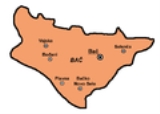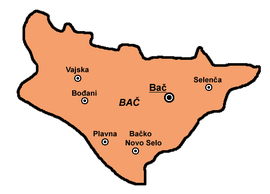
Plavna
Encyclopedia

Serbia
Serbia , officially the Republic of Serbia , is a landlocked country located at the crossroads of Central and Southeast Europe, covering the southern part of the Carpathian basin and the central part of the Balkans...
. It is situated in the Bač municipality
Municipality
A municipality is essentially an urban administrative division having corporate status and usually powers of self-government. It can also be used to mean the governing body of a municipality. A municipality is a general-purpose administrative subdivision, as opposed to a special-purpose district...
, in the South Bačka District
South Backa District
South Bačka District is a northern district of Serbia. It lies in the southern part of Bačka and northern part of Syrmia, in the autonomous province of Vojvodina. It has a population of 607,835...
, Vojvodina
Vojvodina
Vojvodina, officially called Autonomous Province of Vojvodina is an autonomous province of Serbia. Its capital and largest city is Novi Sad...
province. Its population is ethnically mixed and numbering 1,392 people (2002 census).
Name
In SerbianSerbian language
Serbian is a form of Serbo-Croatian, a South Slavic language, spoken by Serbs in Serbia, Bosnia and Herzegovina, Montenegro, Croatia and neighbouring countries....
, the village is known as Plavna (Плавна), in Croatian
Croatian language
Croatian is the collective name for the standard language and dialects spoken by Croats, principally in Croatia, Bosnia and Herzegovina, the Serbian province of Vojvodina and other neighbouring countries...
(Šokac
Šokac language
The Šokac language was a language listed in Austro-Hungarian censuses. Population censuses performed in Austria-Hungary recorded the native language of the citizens, whereby the Šokac language was declared as native language to one part of the population, presumably members of the Šokci ethnic...
) as Plavna, in Hungarian
Hungarian language
Hungarian is a Uralic language, part of the Ugric group. With some 14 million speakers, it is one of the most widely spoken non-Indo-European languages in Europe....
as Palona, and in German
German language
German is a West Germanic language, related to and classified alongside English and Dutch. With an estimated 90 – 98 million native speakers, German is one of the world's major languages and is the most widely-spoken first language in the European Union....
as Plawingen.
Geography
It is located 150 km north of BelgradeBelgrade
Belgrade is the capital and largest city of Serbia. It is located at the confluence of the Sava and Danube rivers, where the Pannonian Plain meets the Balkans. According to official results of Census 2011, the city has a population of 1,639,121. It is one of the 15 largest cities in Europe...
and 75 km of Novi Sad
Novi Sad
Novi Sad is the capital of the northern Serbian province of Vojvodina, and the administrative centre of the South Bačka District. The city is located in the southern part of Pannonian Plain on the Danube river....
, the capital of the province of Vojvodina, at the southwest of Bačka
Backa
Bačka is a geographical area within the Pannonian plain bordered by the river Danube to the west and south, and by the river Tisza to the east of which confluence is located near Titel...
.
Ethnic groups (2002 census)
Its population include:- 607 (43.61%) SerbsSerbsThe Serbs are a South Slavic ethnic group of the Balkans and southern Central Europe. Serbs are located mainly in Serbia, Montenegro and Bosnia and Herzegovina, and form a sizable minority in Croatia, the Republic of Macedonia and Slovenia. Likewise, Serbs are an officially recognized minority in...
- 312 (22.41%) CroatsCroatsCroats are a South Slavic ethnic group mostly living in Croatia, Bosnia and Herzegovina and nearby countries. There are around 4 million Croats living inside Croatia and up to 4.5 million throughout the rest of the world. Responding to political, social and economic pressure, many Croats have...
- 145 (10.42%) Hungarians
- 112 (8.05%) YugoslavsYugoslavsYugoslavs is a national designation used by a minority of South Slavs across the countries of the former Yugoslavia and in the diaspora...
- others.
Historical population
- 1961: 2,662
- 1971: 2,033
- 1981: 1,712
- 1991: 1,538
- 2002: 1,392
Plavna is the birthplace of Antun Gustav Matoš
Antun Gustav Matoš
Antun Gustav Matoš was a Croatian poet, short story writer, journalist, essayist and travelogue writer. He is considered the champion of Croatian modernist literature, opening Croatia to the currents of European modernism, and one of the greatest Croatian literary figures of all time.-Life:Matoš...
's father who was Bunjevac Croat.. Before the Croatian War of Independence
Croatian War of Independence
The Croatian War of Independence was fought from 1991 to 1995 between forces loyal to the government of Croatia—which had declared independence from the Socialist Federal Republic of Yugoslavia —and the Serb-controlled Yugoslav People's Army and local Serb forces, with the JNA ending its combat...
the village was predominantly inhabited by Croats.
Tourism
There is a possibility of hunting deer, doe buck, wild boar, as well as hare, pheasant, partridge and wild duck on an area of 600 hectares covered by wheat and corn.Hunting ground Plavna – Lovačka kuća (Houting house) is located in the village of Plavna surrounded by forest. Along with usual hounting activities, it offers the possibility of tours of the hunting ground, photo – safari, observing wild life. Restaurant can receive 100 quests.
Notable inhabitants
- József Novotny (1908–1944), chaiplan, martyrMartyrA martyr is somebody who suffers persecution and death for refusing to renounce, or accept, a belief or cause, usually religious.-Meaning:...
of the Roman Catholic ChurchRoman Catholic ChurchThe Catholic Church, also known as the Roman Catholic Church, is the world's largest Christian church, with over a billion members. Led by the Pope, it defines its mission as spreading the gospel of Jesus Christ, administering the sacraments and exercising charity...
, a Hungarian of Czech or Slovak origin. He was killed by the Yugoslav partisansPartisans (Yugoslavia)The Yugoslav Partisans, or simply the Partisans were a Communist-led World War II anti-fascist resistance movement in Yugoslavia...
in 1944. http://www.cryingvoice.com/Christian_martyrs/HungComm1.html - Bálint Magyar de Palona (? - 1573), Hungarian general, captain of FonyódFonyódFonyód is a town and holiday resort on the south shore of Lake Balaton, in north-west Somogy, western Hungary, with over 5000 residents.- History :...
, heroe of the struggle against Ottoman invasion. http://konyvtar.fonyod.hu/mbalint.htm

